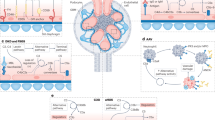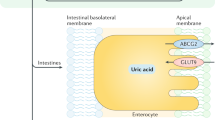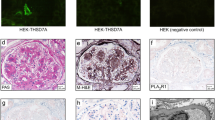Abstract
As a rule, only traces of haptoglobin can be found, by titrimetric method, in the urine of patients presenting a nephrotic syndrome with considerable proteinuria, as against their serum, which is very rich in α2 globulin and especially in haptoglobin. Actually, it is so only in the case of patients belonging to Smithies's groups 2.1 and 2.2 (ref. 1), for, when the serum belongs to group 1.1, the haptoglobin, of lower molecular weight, filtered through the nephrotic kidney, can reach a concentration of several gm. per litre2,3.
This is a preview of subscription content, access via your institution
Access options
Subscribe to this journal
Receive 51 print issues and online access
$199.00 per year
only $3.90 per issue
Buy this article
- Purchase on Springer Link
- Instant access to full article PDF
Prices may be subject to local taxes which are calculated during checkout
Similar content being viewed by others
References
Smithies, O., Advances in Protein Chemistry, 14, 65 (1959).
Jayle, M. F., Vialatte, S., Lagrue, G., and Boussier, G., J. Urol. Med. Chir., 59, 800 (1953).
Jayle, M. F., and Boussier, G., Bull. Soc. Chim. Biol., 36, 959 (1954).
Author information
Authors and Affiliations
Rights and permissions
About this article
Cite this article
MARNAY, A. Haptoglobinuria in Nephrotic Syndromes. Nature 191, 74–75 (1961). https://doi.org/10.1038/191074a0
Issue Date:
DOI: https://doi.org/10.1038/191074a0
This article is cited by
-
Nachweis von Haptoglobinen und Isoagglutininen im Harn bei diabetischer Angiopathie
Diabetologia (1966)
-
Haptoglobinuria following muscular exercise
Experientia (1964)
-
Excretion of Haptoglobin in Normal Urine
Nature (1962)
-
Eigenschaften, Bestimmung und klinische Bedeutung von Haptoglobin
Klinische Wochenschrift (1962)
Comments
By submitting a comment you agree to abide by our Terms and Community Guidelines. If you find something abusive or that does not comply with our terms or guidelines please flag it as inappropriate.



